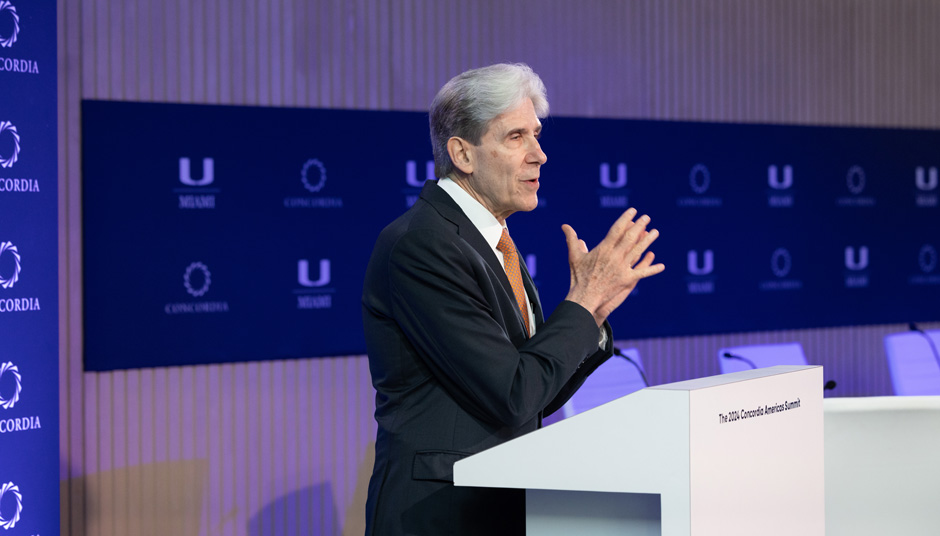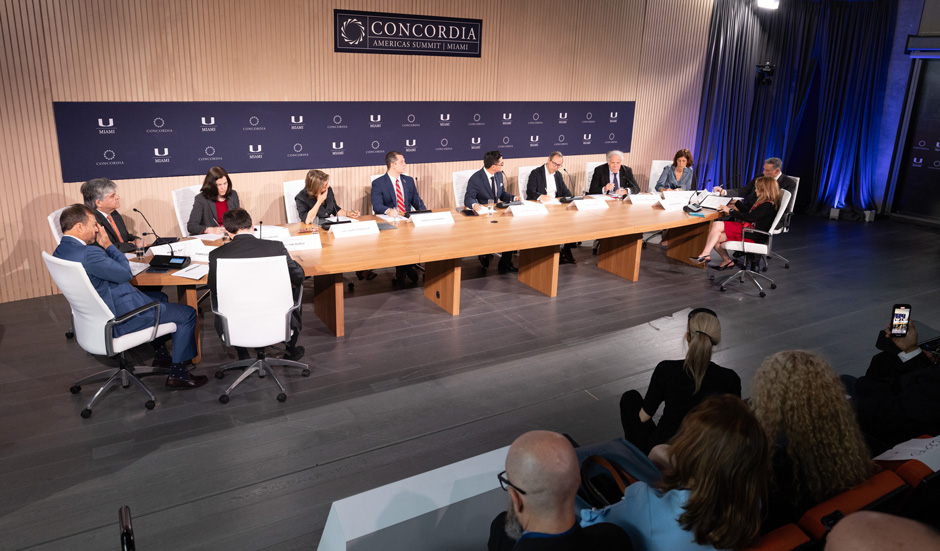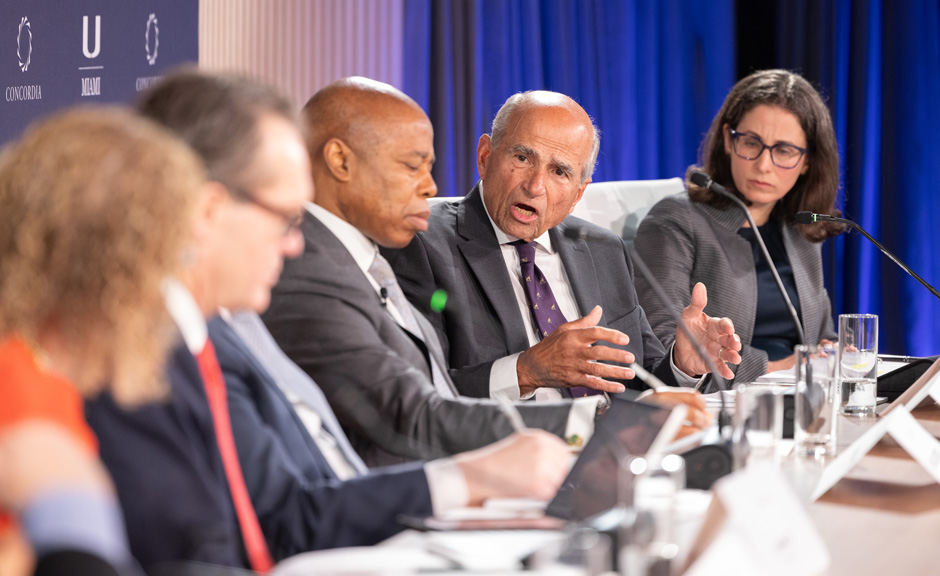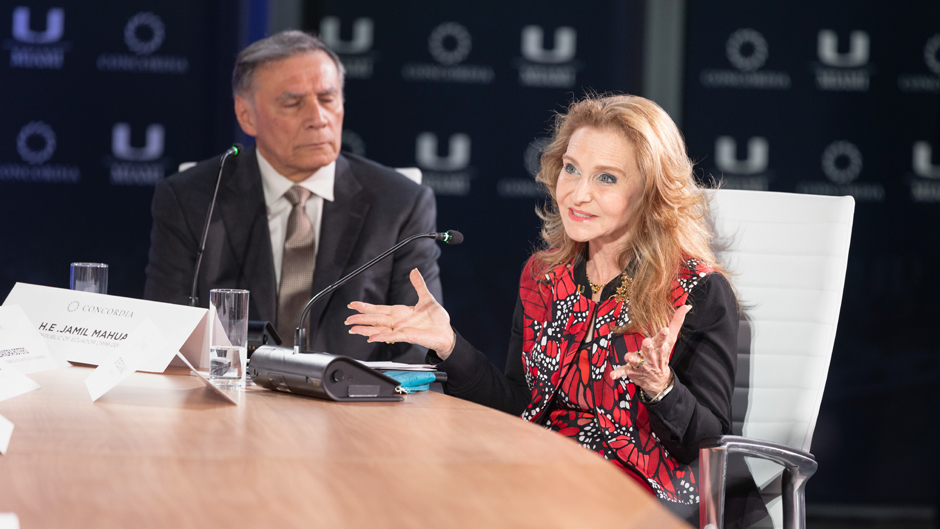In its 8th year, the Concordia Summit at the University of Miami’s Lakeside Village opened on Monday with an impressive lineup of government, academic, and civic leaders discussing topics ranging from governance in Latin America to climate change and the opportunities new technologies offer the region.
The two-day international forum convenes a cross section of decision-makers, thought leaders, and influencers to foster dialogue and forge partnerships around critical issues facing the Western Hemisphere.
“Two years ago, the first time we played host to this event, I shared that from our founding, the University of Miami has been a place of convergence for thinkers and doers from across the Americas,” said University President Julio Frenk in welcoming conference attendees. “We have been a meeting point for people, ideas, geographies, cultures, and generations.”
Frenk said that “as technology makes the world smaller—some might say more dangerous—collaboration becomes all the more vital.”

It is the third year that the meeting has been held at the University thanks to the generosity of trustee emeritus Jose Bared.
Among the dignitaries present were Eric Adams, mayor of New York City, and Daniela Levine Cava, mayor of Miami-Dade County. Each outlined programs instituted in their respective cities to mitigate the effects of climate change.
In the panel “Transformative Alliances: Social Contracts, Governance, and the Role of Collaboration in Latin America’s Progress,” experts agreed that the region has a host of challenges which include high levels of poverty, security issues, polarization, migrant issues, narcopolitics, and a growing distrust of organizations by the public.
The region also lags in economic growth, said Laura Chinchilla, former president of Costa Rica, who was the chair of the 2024 Concordia Summit. She said that Latin America and the Caribbean area cannot escape the geopolitical changes and turmoil that are taking place worldwide.
She said that the World Bank has announced that expected GDP’s growth between 2024 and 2026 in Latin America will be the lowest compared to other regions in the world.
Felicia Knaul, a professor at the Leonard M. Miller School of Medicine and director of the Institute for Advanced Study of the Americas, offered a more optimistic scenario for the region, noting that the internet and new technologies have allowed many to access a wider audience.
“What is happening in civil society is that we have never seen a time in which individuals can communicate and have the power of voice in a positive way in ways we are seeing now. We first heard this from patients’ voices and now we are seeing it across civil society.
“The question,” she continued, “is how to get that together so that we can speak with one voice instead of one cause at a time?”

Fabrizio Opertti, manager of trade and integration for the Inter-American Development Bank, said that everyone should keep in mind that Latin America offers a myriad of solutions for the world’s problems.
“There is food insecurity in the world,” he said. “Latin America is the largest exporter of agriproducts. For energy transition, there can be no energy transition without Latin America. We hold two-thirds of the world’s lithium in the northern triangle—Bolivia, Chile, and Argentina.”
Migrant crisis
With New York, Chicago, and other American cities continuing to be overwhelmed by the surge of migrants crossing the southern border from Mexico and other Central American nations, a midday panel of 12 experts in fields ranging from business and government to law and international relations examined how the influx is impacting the U.S. and discussed strategies to resolve the crisis.
Adams said a lack of coordination at many levels is hindering immigrant-friendly cities from dealing effectively with the crisis.
“And that is totally against the principles of what our country stands for—a place of opportunity and a place of diversity,” the New York mayor said. “Our country’s a country of immigrants.”
Adams, who recently vowed to commit $2.4 billion in aid to pay for the costs of caring for the tens of thousands of asylum-seekers who have arrived in New York, noted the challenges his city faces in housing, clothing, and providing food for multitudes of migrants.
“We need to make sure medical needs are handled. And the biggest obstacle is that they don’t have the right to work. I think that there’s nothing more inhumane than not allowing people to be able to provide for their families,” he said.
Adams offered a solution, proposing to send migrants to U.S. cities that have population deficits and are struggling to fill job vacancies.
“I think if someone comes into the country, I believe you tell them and instruct them, ‘We’re going to bring you to one of our cities or states where we have a population problem. You spend three years there. After the three years there, you can go anywhere you want in the country.’ So, we’re taking their crises and solving our crisis,” Adams said.
Asylum-seekers want to earn their keep, said Adams, noting that on occasions when he has visited the city’s humanitarian relief centers, migrants have told him, “Mayor, we don’t want your free food. We don’t want your housing. We just want to work. We want to pursue the American Dream.”

Bared, a South Florida businessman and entrepreneur and member of the University of Miami’s Board of Trustees who graduated from the institution in 1964 with a degree in mechanical engineering, echoed Adams’ sentiments. “They [migrants] need the work, and we need the workforce,” he said in addressing the role of the private sector in dealing with the migrant situation.
Alejandro Portes, a professor of law and Distinguished Scholar of Arts and Sciences at the University, lamented the fact that the system currently in place for processing newly arrived migrants is seriously flawed, noting that they are often released into the country with a court date for an asylum hearing that is months—and in some cases—years away.
If the system isn’t fixed, Portes asserted, “We’re going to see a quantum expansion of a population living in the shadows.”
Adams summarized the current measures in dealing with the migrant crisis most succinctly when he said, “We’re using a rotary phone method in a smartphone age.”
Security Issues
The final full panel on Monday, “The Rule of Law, Security, and Human Rights in Latin America,” included several key members of Congress, including Ileana Ros-Lehtinen, Carlos Gimenez, and Lindsey Graham.
The discussion, moderated by former spokesperson for the U.S. Department of State Morgan Ortagus, centered on the challenges that Latin America faces maintaining national security and human rights as the quality of democracy falls in the region.
Several Latin American officials were also in attendance for the discussion, including Jorge-Tuto Fernando Quiroga, former president of Bolivia; Juan Guaidó, the former interim president of Venezuela; and Juan Carlos Pinzón Bueno, former Colombian ambassador to the U.S.
Participants engaged in a candid exchange of ideas, exploring innovative strategies to bolster the rule of law in countries with failing democracies, as seen in Venezuela, Nicaragua, and Ecuador.
The panelists emphasized the importance of fostering stronger partnerships between Latin American nations and the international community to tackle shared challenges collaboratively, including issues ranging from the Chinese Communist Party’s growing influence in Latin America and paths to removing dictators like Venezuela’s Nicolás Maduro.
Frenk was also in attendance, with Ortagus asking him the significance of having conversations on U.S.-Latin American politics at the University of Miami.
“There’s a very impressive sense of urgency within this panel on these issues, and having grown up in Mexico, I share that,” Frenk said. “The age at which most people go to university is exactly the same average age when people come to this country—18 years old. This is an amazing opportunity to find solutions for issues on migration and Latin America as we look towards the next generation.”

